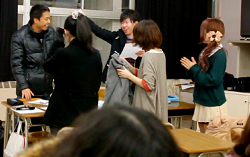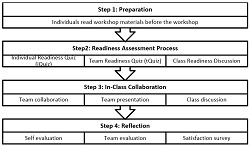References
Adair, J. G. (1984, May). The Hawthorne effect: A reconsideration of the methodological artifact. Journal of Applied Psychology, 69(2), 334-345. doi: 10.1037/0021-9010.69.2.334
Bateman, T. S., & Snell, S. A. (2007). Management: Leading & collaborating in a competitive world (7th ed.). New York: McGraw-Hill Irwin.
Duncan, B. (2013). Assessing the viability of team learning with remedial students in a lecture-based Japanese higher education culture. Ann Arbor, MI: ProQuest LLC, Fielding Graduate University. Retrieved from https://search.proquest.com/docview/1352039981
Duncan, B. (2018, July 11). Considering Interdependent Learning Models to Align Japanese Higher Education Practices with Japanese Societal Values. Retrieved from Donnach.com: http://donnach.com/index.php/en/explorations/learning/232-considering-interdependent-learning-models-to-align-japanese-higher-education-practices-with-japanese-societal-values
Ferrance, E. (2000). Action research. Brown University, Northeast and Islands Regional Educational Laboratory. Providence: LAB.
French, J. (1950). Field experiments: Changing group productivity. In J. G. Miller, Experiments in social process: A symposium on social psychology (pp. 83-93). Experiments in Social Process: A Symposium on Social Psychology, McGraw-Hill, 1950, p. 82.: McGraw-Hill.
Grow, G. O. (1996). Teaching learners to be self-directed. Adult Education Quarterly, 125-149.
Hackman, R. J. (1992). Group influences on individuals in organizations. In D. M. Dunnette, & L. M. Hough (Eds.), Handbook of industrial and organizational psychology (pp. 199-267). Palo Alto, CA: Consulting Psychologists Press.
Imafuku, R., Kurata, N., Kataoka, R., & Mayahara, M. (2010, December 3). First-year students' learning experience of problem-based learning tutorials in Japanese higher education. Enhancing learning experiences in higher education international conference. Hong Kong, China: University of Hong Kong.
Jex, S. M., & Britt, T. W. (2014). Organizational psychology: A scientist-practitioner approach. New York: John Wiley & Sons.
Lewin, K. (1946). Action research and minority problems. Journal of Social Issues, 2(4), 34-46.
McVeigh, B. J. (2002). Japanese higher education as myth. Armonk, NY: M. E. Sharpe, Inc.
Michaelsen, L. K. (2004). Getting started with team-based learning. In L. K. Michaelsen, A. B. Knight, & L. D. Fink (Eds.), Team-based learning: A transformative use of small groups in college teaching (pp. 27-50). Sterling, VA: Stylus Publishing, Inc.
Nagao, N., Takashi, I., & Okuda, S. (2011). Motivating learning through a learning team framework [学習意欲を引出すチーム学習の枠組み]. (B. Duncan [Translator], Ed.) Osaka Shin-ai Jokakuin Bulletin, 45, 1-8. Retrieved September 15, 2012, from http://www.osaka-shinai.ac.jp/library/kiyo/45.html
Tsuneyoshi, R. K. (2001). The Japanese Model of schooling: Comparisons with the United States. New York, NY: Routledge.
University of Phoenix. (2004). Learning team handbook. Retrieved October 7, 2008, from Apollolibrary.com: http://www.apollolibrary.com/LTT/toolkit1.aspx?bc=1
Vygotskiǐ, L. S. (1978). The development of higher psychological processes. (M. Cole, S. John-Steiner, & E. Douberm, Eds.) Cambridge, MA: Harvard University Press.




